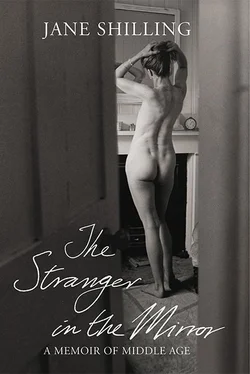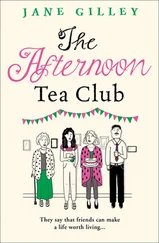I found myself searching junk shops and charity stalls for things that would echo the spirit of the house: not presents for myself (I rationalised), but propitiatory offerings to the household gods. A pair of carved wooden wall sconces in the shape of a child’s plump fists, a bunch of blue jay’s feathers, sea glass and shells, and two bronze griffon’s claws – the disembodied feet of some long-vanished piece of furniture – which gripped the ground at either side of the hearth. It was like living in a storeroom of cast-off artefacts from the Pitt Rivers museum: crowded, but interesting.
‘You’ll end up like one of those women in a Molly Keane novel,’ said an old friend. ‘Living in one room, boiling a kettle over an open fire in the grate, surrounded by the worm-eaten ruins of good furniture and chipped oddments of Royal Doulton.’ I was extremely taken aback by this vision of my future. It felt as though I’d visited a fairground fortune teller and instead of the usual comforting predictions of wealth, love and long life, had been told in exchange for my money to expect misery, loneliness and penury.
Cruel, I said. What a cruel thing to say. And of course if you were to take care of me, nothing like that would happen. The friend, who liked a quiet life, backtracked as fast as he could: my little house was lovely, my taste perfect, my fondness for eccentric objects highly original; of course he would never let me dwindle into a solitary madwoman. But it was too late. The sense of fragility, of the contingency of my life as a construct that I had felt during the row with my son in Crete now returned, more menacing than before. Someone who knew me well and cared for me had seen my fate, and it wasn’t anything like the version I had been conjuring for myself.
As though his prediction had released some kind of virulent spore into the air, signs of decay began to encroach upon the house. The downstairs rooms were clad in wooden tongue-and-groove on which cushiony black fungus began to bloom. A crack appeared where the bathroom extension met the main house. When it rained, large puddles formed on the floor. After a particularly violent storm it rained down the stairwell too. The walls were all mottled and damp. It was my fault. I had done no maintenance since I’d moved in – hoping always to make enough money to set things right, but never saving enough, always succumbing to the pretty object, the irresistible treat, grasping the possibilities of the present and trusting the future to take care of itself.
The indoor rain dampened my insouciance. I resolved to be sensible from now on. I commissioned a firm of local builders to caulk and make watertight my house. The firm was run by a pair of brothers of whom the elder came to inspect the work that needed to be done. He was an avuncular figure with a comfortingly phlegmatic way of dismissing the various cracks and bulges that I interpreted as signs that the house was about to fall down. I felt reassured that this correction, this bit of making good, would be enough to ensure a change in the psychic weather from foul to fair. The house would be sweet and dry again, and we would be safe.
The builders asked for money in advance. Quite a lot of it. The elder brother was replaced by his less avuncular younger brother. Little progress was made. The back door frame was so badly decayed that the door fell off its hinges. We slept a night in the house with the door frame gaping open to the dark and whatever stirred in it.
The rain continued to fall indoors. The drains became sluggish, unreponsive to the sinister concoctions of syrupy purple vitriol that I poured down them (they went down with a spiteful hiss, sending a wisp of sulphurous white smoke, like a sleeping dragon’s breath, coiling up from the plughole).
In the back garden the jasmine and climbing roses grew unchecked and monstrous, swarming up the rotting trellis until the weight of them brought down the panels, which swiftly became engulfed in a mass of tangled stems so dense as to be impervious to my haphazard snipping with shears and secateurs. I knew I should do something, but I felt paralysed, as though the strangling honeysuckle and jasmine had engulfed my spirit as well as my garden. My money was gone. I daren’t borrow more. Besides, I had other things to worry about.
While the garden grew unchecked so, suddenly, did my son. Overnight, or so it seemed, he sprang from being half a head shorter than me to half a head taller. A faint shadow marked the still childish curve of his upper lip. In a strong light, fine pale-gold threads of incipient beard could be seen growing from his cheeks and chin like tendrils groping towards the light. When I went into his room in the mornings he would be asleep on his front in the deep abandoned unconsciousness of adolescence, with his newly hairy ankles (and when did that happen? The golden down of childhood replaced by this wiry, greyish pelt that glinted bronze in the morning light?) and huge yellowish feet sticking out beyond the edge of the mattress of his little iron bed.
The sight reminded me of the chapter in Winnie-the-Pooh in which the bear gets stuck in the entrance to Rabbit’s hole and is obliged to remain there, fasting, with his snout in the open air and his back legs protruding into Rabbit’s kitchen until he gets thin enough to emerge. Rabbit, pragmatic, uses the legs as a drying rack for damp tea towels. In a spirit of frivolity one morning I draped clean T-shirts over my son’s stuck-out legs. He wasn’t amused.
He was unamused in a new, deep-voiced, grown-up way. No, Mother! he said, in the tone of a grown man exercising his authority. This was new, too. Throughout my grown-up life the only will, the only temperament in my household had been mine. I was amused and obscurely pleased. After an adult lifetime of not deferring to anyone, making every decision myself, from what to eat to where to go on holiday, I thought it would make a nice change to have a man about the place, imposing himself.
Walking down a street with this large young man beside me, turning my face up, rather than down, to his as we spoke brought back a feeling that I hadn’t had since my twenties. When he was born I felt certain that single motherhood would mean the end of love affairs, partly because no one would want me, encumbered with a child; partly because I couldn’t see a way back from the wreckage of the attachment that had produced my son.
About the first assumption I was wrong: All sorts of grown-up Lost Boys, observing me kind but firm with my own child, were keen to attach themselves to me in the hope that I’d take the same line with them. If what I had wanted was a boyfriend, I would have had less trouble finding one after the baby than before. But I had grown wary and cautious now that I had not only myself but my son to think about when allowing someone over the threshold of domestic intimacy. I couldn’t afford to be making experiments. The list of necessary qualities seemed too complicated and exigent for one man to embody them all.
‘You’ll never get a man now,’ said a friend’s husband. ‘You’re too much of a perfectionist.’ After a couple of cautious skirmishes and the painful entanglement with the doctor – especially painful because he had seemed, miraculously, to possess all the qualities of trustworthiness, kindness, dependability and what-have-you that I had thought it impossible for one man to embody; besides which, my son liked him – I concluded that the friend’s husband was right and that protracted, perhaps permanent, solitude would be the price I would have to pay for motherhood.
A distinctive feature of the Greenwich house was that it seemed quite hostile to men. Its dimensions were too small; its rooms too cramped. Over time I had furnished it with furniture constructed, like the house itself, for the less well-nourished generations of the early 1800s. As long as my son was a child, the oddness of the proportions wasn’t really apparent. It was only when a farmer friend came to supper and couldn’t fit his huge agricultural knees under the table, or when my son was mugged for his phone on the way home from school and several strapping policemen tried to squash themselves and their laptop on to the three-quarter-sized sofa that had always seemed such a cosy fit for the two of us that I suddenly felt the press of the shrunken world we inhabited.
Читать дальше












